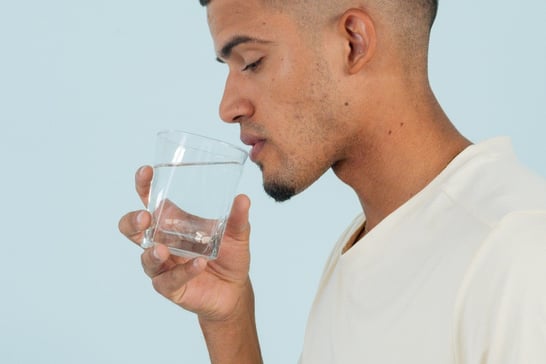Hydration and immunity: the power of water and its influence on health
Written by: Kelsi Irvine, 4Life Research and Development Scientist
Water is the most essential part of our diet. Humans can go weeks without food, but we would die in just a few days without access to water. It might seem strange that, given that something so essential to our health, we often forget to prioritize drinking water throughout the day.
The Centers for Disease Control and Prevention estimates that the average adult drinks about 44 ounces of water a day. However, while recommendations vary by age, weight, and gender, many agree that we should drink between 64 and 100 ounces of water a day. Most people can easily avoid dehydration; staying hydrated is important for the functioning of all body systems, including the immune system, muscles, and major organs. With just a few simple adjustments to our daily habits and routines, we can improve our hydration and overall health.
The importance of hydration
Drinking adequate amounts of water is vital for optimal bodily function. While drinking enough water is important for everyone, some people—such as athletes, children, and older adults—should pay special attention to drinking enough water, as they may be more prone to dehydration. Additionally, anyone who is ill, pregnant, or breastfeeding will need to consume more water to replace lost body fluids. Fluid deficiency, in addition to overworking the organs, can cause confusion, fatigue, mood swings, dizziness, irritability, and excessive thirst.
Proper hydration is essential for the proper functioning of the body's systems. When the body is dehydrated, the volume of blood the heart pumps throughout the day decreases, causing the heart to work harder and beat faster to circulate the blood that carries oxygen and essential nutrients to the cells. Consequently, dehydration can increase heart rate and raise blood pressure.
The kidneys are other organs affected by dehydration because their function is to allow the body to regulate the amount of water it retains and excretes, so that cells remain in a state of balance called homeostasis. When there is too much water in the body, the kidneys eliminate fluid through urine. However, when water is less abundant, the kidneys must work harder to conserve fluids and require additional energy to filter the blood and eliminate toxins. By drinking water throughout the day, we help keep our heart, kidneys, and other organs healthy.
Hydration and the immune system
The cells of the immune system keep the body safe from potential health threats. The bloodstream transports the cells that patrol the body for health threats and also the cells that fight those threats. Dehydration can impair the immune system's response to health threats.5 For this reason, it's important to keep the immune system functioning properly to support overall health.
The body also has incredible natural defenses, including barriers like the skin, saliva, and mucous membranes that help block and prevent health threats from entering. However, the body requires water to maintain proper production and function of these natural immune defenses. Dehydration can lead to a decrease in the amount of proteins found in saliva that help protect the body from health threats; drinking water can help replenish these important defense proteins in saliva.
A healthy immune system impacts many areas of health, and one way to protect and support it is to drink enough water. This is yet another reason why staying hydrated is extremely important!
The importance of electrolytes
Electrolytes are another essential element of hydration because they help maintain healthy cells during homeostasis. Electrolytes are nutrients composed of salt, magnesium, potassium, and other essential minerals. When the body is physically active, it loses electrolytes through sweat, which is why it's important to rehydrate with an electrolyte-containing beverage when we exercise or sweat profusely.
When the body overheats, we sweat to maintain a healthy body temperature, which is especially important for those living in hot climates, as they may need to drink more water to stay hydrated. Proper hydration is essential to prevent heat stroke or heat exhaustion, especially for children and the elderly. 2 An electrolyte energy drink or a powdered product that can be added to water are good options to help with hydration.
Drink between 8 and 12 glasses of water a day.
If you struggle to drink all the water you should, try drinking a glass of water with each meal and another when you wake up and go to bed.
Buy a reusable water bottle and take it with you everywhere.
Eat plenty of fruits and vegetables that contain a lot of water.
Remember to replenish your water intake after intense activity. Be sure to drink extra water if you've participated in an activity that makes you sweat, and don't forget to replenish your electrolytes.
Try to avoid beverages that can cause further dehydration, such as soda, coffee, or alcohol.
Take 4Life Transfer Factor® Immune Boost! Dissolve this delicious orange-flavored blend of electrolytes, vitamin D, vitamin C, and zinc in a glass of water. You'll not only stay hydrated and replenish your electrolytes, but you'll also give your immune system a boost, as 4Life Transfer Factor Immune Boost contains 4Life Transfer Factor®, which has been clinically shown to activate the immune system within two hours.7*
And remember, when your body feels thirsty, it's telling you it needs to hydrate. When your cells detect that there isn't enough water, a chain reaction occurs that makes you feel dry. Pay attention to the signals your body sends because they're meant to keep you healthy.
Prioritizing hydration is key to maintaining optimal health and supporting a healthy immune system. With just a few simple adjustments to our daily routine, we can improve our hydration levels and contribute to our overall well-being.




